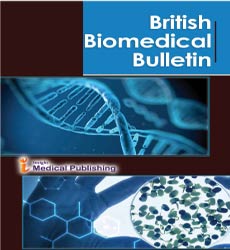ISSN : 2347-5447
British Biomedical Bulletin
Innovations in Translational Medicine: Bridging Research with Clinical Care
Robert David*
Department of Internal Medicine, Rice University, Houston, Texas, USA
- *Corresponding Author:w
- Robert David
Department of Internal Medicine, Rice University, Houston, Texas,
USA,
E-mail: david_r@gmail.com
Received date: August 23, 2024, Manuscript No. IPBBB-24-19667; Editor assigned date: August 26, 2024, PreQC No. IPBBB-24-19667 (PQ); Reviewed date: September 09, 2024, QC No. IPBBB-24-19667; Revised date: September 16, 2024, Manuscript No. IPBBB-24-19667 (R); Published date: September 23, 2024, DOI: 10.36648/2347-5447.12.3.59
Citation: David R (2024) Innovations in Translational Medicine: Bridging Research with Clinical Care. Br Biomed Bull Vol.12 No.3: 59.
Description
Translational medicine has emerged as a vital field in healthcare, representing a transformative bridge between basic research and clinical practice. It seeks to apply discoveries made in laboratories to real-world treatments for patients, aiming to accelerate the development of new therapies and medical technologies. This dynamic process brings together interdisciplinary teams of scientists, clinicians and healthcare providers to streamline the path from discovery to application, ensuring that advancements in science can rapidly benefit patient care. As we continue to witness the explosion of knowledge in life sciences, translational medicine serves as a vital driver of innovative treatments. The premise of translational medicine is simple: The quicker we can translate scientific discoveries into clinical interventions, the faster we can improve patient outcomes. However, the execution of this goal is complex and requires a unique blend of expertise, collaboration and infrastructure. It transcends traditional academic boundaries, calling on the integration of molecular biology, genomics, pharmacology and clinical science to address critical medical challenges. In this context, translational medicine fosters a bidirectional flow of knowledge: Research findings are applied to patient care and clinical experiences inform new research questions, closing the loop between laboratory investigation and bedside application.
The role of translational medicine in precision medicine
Many potential discoveries made in basic science fail to make it to human trials, often due to issues related to funding, regulatory hurdles, or inefficacies in animal models. Addressing this gap is vital for ensuring that the potential benefits of innovative research are not lost before reaching the clinical stage. To overcome these challenges, translational medicine emphasizes the need for strong infrastructure, efficient collaboration and clear regulatory pathways. Public-private partnerships are increasingly seen as a way to leverage resources from both sectors to support translational efforts. Moreover, biobanks, patient registries and advanced data analytics are playing pivotal roles in collecting and interpreting information that informs the development of new therapies. The integration of big data into medical research allows for more precise and individualized treatments, heralding an era of precision medicine where therapies are customized to the unique genetic and molecular profiles of patients. Precision medicine is one of the most exciting frontiers in modern healthcare and it owes much of its advancement to the principles of translational medicine. By focusing on the genetic, environmental and lifestyle factors that influence disease, precision medicine aims to provide treatments customized to each patient. Translational medicine is instrumental in this effort, facilitating the rapid movement of genetic discoveries from the lab to clinical applications.
The need for collaboration and innovation
One notable success in this area is the development of targeted cancer therapies. Through translational research, scientists have identified specific mutations that drive tumor growth, leading to the creation of drugs that target these mutations with remarkable precision. These breakthroughs have transformed cancer care, moving away from one-size-fits-all treatments to therapies designed for each individual’s unique cancer profile. Beyond oncology, translational medicine plays a key role in a variety of medical fields, including cardiology, immunology and neurology. For instance, the identification of biomarkers through translational research has opened new method for diagnosing and treating cardiovascular diseases. Biomarkers can predict disease risk or progression, allowing physicians to intervene early and improve outcomes. Similarly, in neurodegenerative diseases such as alzheimer’s, translational medicine is driving efforts to find treatments that can slow or even reverse disease progression by translating basic research on disease mechanisms into potential therapies. As the field of translational medicine continues to grow, further collaboration between academia, industry and government will be critical. The complexity of today’s medical challenges requires interdisciplinary approaches and sustained investment in research and infrastructure. In addition to collaborations, the role of patients is becoming increasingly important. Patient-centered research models, where patients are active participants in the research process, are gaining traction, ensuring that the patient perspective is incorporated from the outset. Innovations in digital health and Artificial Intelligence (AI) are also expected to revolutionize translational medicine. AI has the potential to analyze vast amounts of data rapidly, identifying patterns and predicting outcomes with a precision that was previously unimaginable. This can expedite the development of treatments, reduce the time spent in clinical trials and ultimately bring new therapies to market more quickly. Translational medicine holds the potential of transforming healthcare by accelerating the journey from scientific discovery to patient care. As we move forward, the integration of new technologies and patientcentered approaches will be key to unlocking the next generation of medical breakthroughs, ensuring that the fruits of research benefit patients worldwide.
Open Access Journals
- Aquaculture & Veterinary Science
- Chemistry & Chemical Sciences
- Clinical Sciences
- Engineering
- General Science
- Genetics & Molecular Biology
- Health Care & Nursing
- Immunology & Microbiology
- Materials Science
- Mathematics & Physics
- Medical Sciences
- Neurology & Psychiatry
- Oncology & Cancer Science
- Pharmaceutical Sciences
